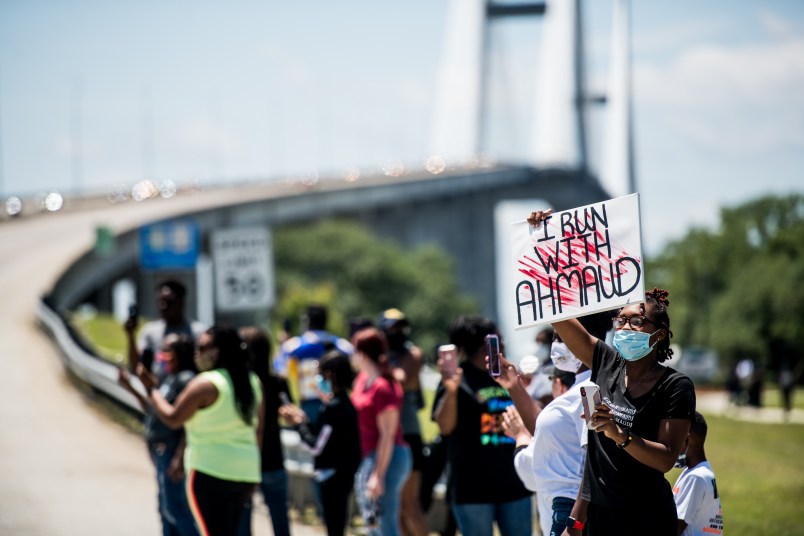This article is part of TPM Cafe, TPM’s home for opinion and news analysis.
When Ahmaud Arbery lost his life, allegedly at the hands of a white father and son, he fell victim to America’s long history of white prerogative to determine life and death for African Americans. This violence is nowhere near abatement, as the deaths of Trayvon Martin, Eric Garner, Tamir Rice, Botham Jean, and too many others in recent memory attest.
It is further proof that in this nation one’s mere existence can be an existential threat. Certain Americans risk their lives when walking, driving, or jogging, while others can carry assault rifles into the Michigan statehouse in their unified protest. Such discrepancies point to the fact that although many enjoy some semblance of life, liberty, and the pursuit of happiness, others are denied the right to life, period.
In the long history of American racism, black Americans have been refused the right to bodily safety. One of the key measurements of sovereignty is corporeal preservation — the freedom to move, to physically express one’s desires and inclinations.
When the United States became a country in the eighteenth century, the concept of individual freedom was to be the bedrock of national sovereignty. The country could only be as free as the citizen. But this individual sovereignty was contingent upon its opposite: unfreedom. Not everyone was entitled to the Enlightenment’s “rights of man” guarantees. Accordingly, American republicanism viewed the black body in terms of partiality, worth only three-fifths of a white person as codified in the famous compromise at the Constitutional Convention in 1787. This fractionalized personhood continues to make for a differentiated sovereignty in the body politic. We have yet to shift from this politics of partiality to the politics of wholeness in the construction of citizenship.
Slavery codified racial violence in the expansion westward, which rested on ordaining some to enact racialized violence (white settlers) and forcing others to be victims of it (African Americans, Native Americans, Mexican Americans, Asian Americans). Even after abolition, numerous legal avenues permitted whites to dominate and control the bodies of African Americans. Among these variants were the convict lease system, lynching, sundown towns, and myriad Jim Crow laws — in the North and South — that legalized different forms of white violence against black citizens.
This structure has underwritten a key paradox of American citizenship: institutionalized violence against some ensures freedom for others, which has made for differential states of sovereignty in the racial caste system.
But too often, this history is said to have disappeared, occluded by cheers for the purported post-racial landscape of today. Jim Crow died. Barack Obama was elected president. Poor whites suffer as nonwhites make strides. Yet the beat of racial violence marches on.
More acutely felt since 2016 is an ascending white nationalism along with a growing chapter in the long civil rights movement filled with scenes of grief and anger. Countering the steady stream of white supremacist violence is a forceful reckoning and potential revolution around African American injury and victimhood in the national imaginary.
With another death comes more outcry. And this public showing of revulsion is important. Collective grief must become the basis for reimagining political communities without racial violence. Mourning is a necessary step in the shift from partiality to wholeness, and through this metamorphosis emerges an anger that can be harnessed politically. Justice in this scenario depends on demonstrations of protest and refusal. It depends on the concerted endeavor to rewrite the public script of mourning, to move blackness from a state of abjection to sovereign personhood. Such emotional eruptions have a history in America’s democratic project. They are part of our history of political action and will underwrite any renaissance in the individual sovereignty we can hope to produce.
Ahmaud Arbery and the legions who preceded him and will follow enjoy no claim to corporeal freedom as an inherent right. They deserve grief in the national frame, followed by action. In making black lives matter, we must force the dirge of mourning to become the beacon of mobilization.
John A. Gronbeck-Tedesco is the associate professor of American Studies at Ramapo College of New Jersey.







It’s too late the Glynn County Police are out in force providing eviden that Arbery was no angel, and that the McMichaels were within their god given rights to defend themselves by hunting him down.
I’m waiting for the police records of both McMichaels to be released to the media, just as Arbery’s was. Any of the interactions they might have had with law enforcement during the entirety of their adult lives. Particularly the son.
Waiting…but not holding my breath.
There were two crimes that day. The murder of Arbery and a “conspiracy of blue to cover it up”. The conspiracy was of the usual order. Pepper the issue with irrelevant allegations against the victim in hope of making people think he deserved to die. The killers had ties to law enforcement and the police department that responded is a rinky dink pudunk one. The problem they had was we’ve seen it before in the Travon Martin murder and are on to it. Law enforcement types or in the case of Zimmerman wannbes arm up looking for trouble. In both cases the Black kid is accosted while doing nothing wrong. And ends up dead. Small town cops let the killers go on flimsy ridiculous claims and “code of blue” bullshit.
I don’t think it’s going to work this time.
Good. Might go out and do some gardening, the wait is going to be boring…
Not going to happen. Both red necks had ties to law enforcement so if there was dirt it’s gone now.